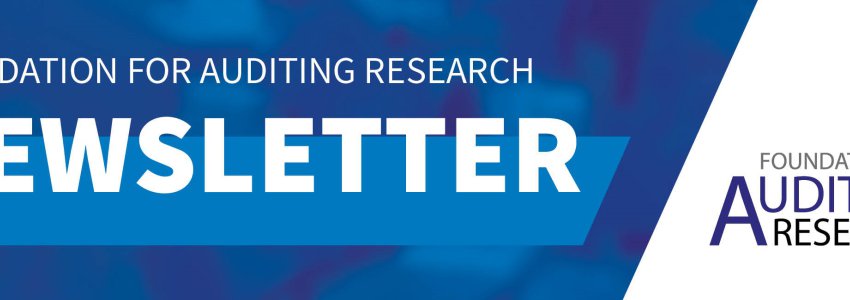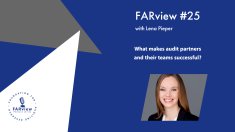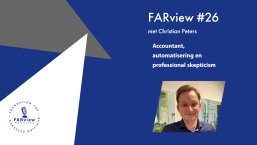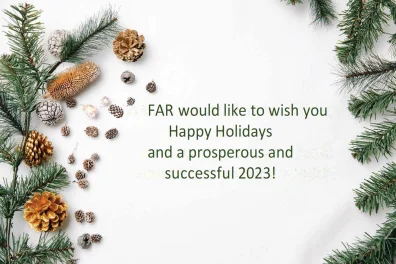Newsletter December 2022
23 December 2022

Want to be the first to know? Then don't forget to follow our LinkedIn page. Did you know that FAR also has a YouTube channel? Here you can find all of the FARview Podcasts.
In this newsletter:
- FAR Call for Research 2023
- FARview #25 with Lena Pieper on 'What makes audit partners and their teams successful?'
- FARview #26 (in Dutch) with Christian Peters on 'Auditor automation usage and professional skepticism’
- Article Frank Moers in Accountant.nl on 'The loss of talent' (in Dutch)
- Inaugural address Jere Francis published in The British Accounting Review
- Brown bag seminar Christian Peters
- First issue E(SG) Journal
- Upcoming events – save the dates!
- Happy Holidays
FAR Call for Research 2023
Aimed at enhancing knowledge exchange between academia and practice and academically informing practitioners and (public) policy makers in their continuous improvement efforts with regard to the auditing profession, the Foundation for Auditing Research is issuing two topics in their Call for Research this year (2023):
- Audits in the mid-size Segment:
With this Call for Research Project Proposals 2023 the Foundation for Auditing Research (FAR) invites scholars to submit a proposal for research projects that provide academics and/or practitioners insights into auditing by Mid-size audit firms. This call is the result of a joint working group of academics and practitioners and seeks to investigate: (1) Audit and Assurance Services for Owner-Managed Businesses, (2) Audits of Less Complex (and / or Smaller) Entities, (3) Learning Climate in Mid-size Audit Firms, (4) Tier-based Market Response on Audit Regulation. Please see the full note here:
Proposal Audits in the mid-size Segment
- Audit Innovation
With this Call for Research Project Proposals 2023 the Foundation for Auditing Research (FAR) invites scholars to submit a proposal for research projects that provide academics and/or practitioners insights into audit innovation. This call is the result of a joint working group of academics and practitioners and seeks to investigate how new data sources and new modes analyses affect the (future) of audit and audit quality. The projects on audit innovation extend to four dimensions: (1) Data and Reliability; (2) Nature of audit services; (3) Organizational impact of data-driven audits and (4) Risk assessments. Please see the application criteria, profile, and guidance here:
The application form for both Calls for Research proposals can be found here:
The application deadline is March 1st, 2023. For further information or questions, please contact FAR at info@foundationforauditingresearch.org
FARview #25 with Lena Pieper on 'What makes audit partners and their teams successful?’

The broad research question of her PhD-study is ‘What makes audit partners and their teams successful?’ In the podcast, Lena clarifies the importance of the audit team and zooms in on the essential role that the audit partner plays (also in combination, or ‘dyad’, with the audit manager). Of course, there is ample attention for the contribution of research in this area.
Lena draws on insights from the fields of psychology and organizational behavior. Her dissertation encompasses three different levels. First, she examines audit partners’ and managers’ personality characteristics and how these characteristics affect their individual job performance. Second, she investigates the partner-manager ‘dyad’ and its functioning. At the third level, she investigates different aspects of audit team functioning and how the team is influenced by the partner-manager dyad.
Her research contributes to the academic literature in several ways. With the comprehensive data set from practicing audit teams and their leaders, the studies advance the understanding of the factors that influence the functioning of an engagement team. This is important because the audit is ultimately conducted by a team rather than by one individual and a well-functioning engagement team is crucial for audit quality. The studies also have practical implications for the audit firms. The findings can help the firms to manage and compose their audit teams in a more scientific way to improve the performance of the audit teams, and ultimately audit quality. With her research, Lena hopes to contribute to the vision ‘accounting as a learned profession’, where research helps auditors to enhance audit quality.
Click here to listen to the podcast on Soundcloud: https://tinyurl.com/Lena-Pieper
FARview #26 (in Dutch) with Christian Peters on 'Auditor automation usage and professional skepticism’

In FARview #26, Christian Peters talks about his paper 'Auditor Automation Usage and Professional Skepticism'.
Auditing firms are investing billions in implementing technology in auditing. In his research, Christian studies the behavioral aspects that may play a role in the use of this technology. One of the risks is that in some situations, auditors may trust technology more than is warranted.
Using an experiment on reviewing a stock count, Christian shows that auditors act less skeptical when they get audit information from an algorithm than when the information comes from a person. These auditors also detect fewer errors. Thus, the use of technology may have a negative effect on the auditing behavior of auditors. The identified negative effect of technology can be reduced by applying an intervention in the form of a 'counterarguing mindset'.
Click here to listen to the pocast on Soundcloud: https://lnkd.in/exhwuSvu
Article Frank Moers in Accountant.nl on 'The loss of talent' (in Dutch)
Frank Moers is professor of Management Accounting & Control at Maastricht University. His research focusses on talent loss and possible effects on audit quality. "Audit firms need to identify and value employees' potential faster and better in order to retain them".
Please click the button below for the full article.
Inaugural address Jere Francis published in The British Accounting Review

This paper updates how archival audit research has evolved since the summary in Francis (2004) of what we knew then about audit quality. The paper describes an evolution from “going big” and asking basic questions about the audit market, institutions, and audit quality, to “going small” with a focus on smaller units of analysis (offices, partners, and engagement teams) as the key to understanding audit quality. I used to believe that audit firm differences, and differences across offices within firms, were the most important audit-related sources of variation in quality, and that differences in people and audit teams were relatively unimportant. However, the evidence in Cameran, Campa and Francis (2022) using UK partner data convinced me otherwise. I now believe the behaviors of partner-led engagement teams are just as important (and maybe more important) than audit firms and offices in understanding audit quality. However, to learn more about partner-led teams means going inside the black box of audit firms, which requires proprietary data from audit firms and research access to their professional staff. I conclude with an example of collaborative research with audit firms.
FAR Brown Bag Seminar 18 November 2022

On Friday, November 18, 2022, FAR hosted another online Brown Bag Seminar for Young Academics and Young Profs, with Christian Peters from Tilburg University, in which he presented his paper Auditor Automation Usage and Professional Skepticism from FAR PhD project 2020B03.
Audit firms increasingly employ automated tools and techniques in auditing procedures. The premise of using automation is that it increases audit effectiveness and audit efficiency. For these effectiveness and efficiency gains to materialize, auditors need to use automation in an adequate manner. Regulators, however, have raised concerns that auditors may over- or under-rely on automation. I predict that auditors are subject to an automation bias and use cues from automated tools and techniques as a replacement for vigilant information seeking, thereby reducing
professional skepticism when relying on automation.
My findings are in line with my predictions. When auditors rely on work conducted by automated tools and techniques, they are less skeptical than when relying on the same work conducted by an audit team member. Based on psychology theory, I employ a counterarguing mindset intervention that alleviates the negative effects of automation on professionally skepticism. Finally, I also test whether a reduction in vigilance caused by automation usage spills over to subsequent tasks. I do not find evidence indicating a spillover effect.
Thank you to Christian Peters for sharing these insights and to Renske Evers of Deloitte and Rotterdam School of Management, Erasmus University for an excellent discussion! Also, thank you to all 27 young participants of various audit firms and universities who participated in our online research seminar and all the feedback from both practice and academia on Christian's research.
First issue E(SG) Journal
Last month the first issue of the E(SG) journal appeared. The founding/managing editors are Jan Bouwens, Professor, Faculty of Economics and Business, Accounting Section, University of Amsterdam, Peter Easton, Academic Director, Center for Accounting Research and Education, Notre Dame Alumni Professor, University of Notre Dame, W. Robert Knechel, Frederick E Fisher Eminent Scholar, Director, International Accounting and Auditing Center, Warrington College of Business, University of Florida and Shiva Rajgopal, Roy Bernard Kester and T.W. Byrnes Professor of Accounting and Auditing, Columbia Business School.
Issue 1- Accountability in a Sustainable World Quarterly 11-11-22 (fliphtml5.com)
Upcoming events – save the dates!

FAR Conference 2023
We would like to let you know that we have set the date of our 2023 Annual Conference for Monday, June 19 and Tuesday, June 20. We are currently busy determining the program, but please mark these dates in your calendars for next year!

Do you have suggestions on how to improve our newsletter or news you would like to share with us? Please let us know by sending an email to
info@foundationforauditingresearch.org
Back to overview
